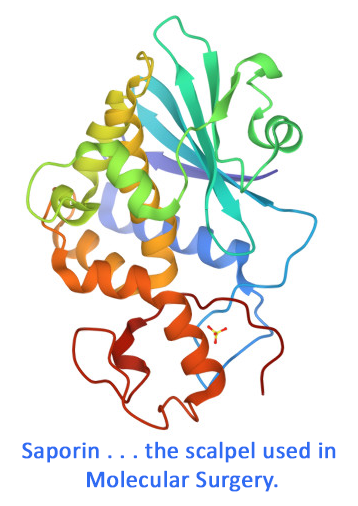Saporin is obtained from the seeds of the Soapwort plant (Saponaria officinalis), a plant that grows wildly in Britain and other parts of Europe. Saporin is a plant enzyme with N-glycosidase activity that depurinates a specific nucleotide in the ribosomal RNA 28S, thus irreversibly blocking protein synthesis. It belongs to the well-characterized family of ribosome-inactivating proteins (RIPs). There are two types of RIPs: type I, which are much less cytotoxic due to the lack of the B chain and type II, which are distinguished from type I RIPs by the presence of the B chain and their ability to enter cells on their own. However, type I RIPs can still be internalized by fluid-phase endocytosis. Upon internalization, the ribosomes are inactivated, resulting in cell death.
This antibody recognizes saporin. Saporin was used as the immunogen. The antibody was affinity-purified against saporin attached to a CnBr-Sepharose support column. It has been conjugated to biotin via an amide bond. The antibody is routinely tested by Western blot.
Applications include immunoblotting.
Saporin Products:
Saporin Chicken Polyclonal, affinity-purified (Cat. #AB-17AP) | biotin-labeled (Cat. #AB-17AP-BT) | Alexa488-labeled (Cat. #AB-17AP-FLA)
Saporin Goat Polyclonal (Cat. #AB-15) | affinity-purified (Cat. #AB-15AP) | affinity-purified biotin-labeled (Cat. #AB-15AP-BT) | affinity-purified HRP-labeled (Cat. #AB-15AP-HRP) | affinity-purified Alexa488-labeled (Cat. #AB-15AP-FLA) | affinity-purified FITC-labeled (Cat. #AB-15AP-FL)
Saporin Rabbit Polyclonal, affinity-purified (Cat. #AB-41AP)
keywords: saporin, saponaria officinalis, plant enzyme, RIP, ribosome-inactivating protein, RIP I, internalization, cell death, Anti-Saporin, Anti-SAP, biotin



Reviews
There are no reviews yet.